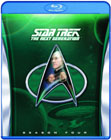In Theory
Nestled into the end of TNG's fourth season is this relatively quiet episode
of idle experimentation. Though there was some potential with the core ideas,
I'm not convinced the writers found a direction in which to take things that
made the tale truly worthwhile.
Data's kind, sweet, helpful persona gradually attracts a fellow crewmember's
romantic interest,
and he is faced with the conundrum of what to do with the possibilities.
Okay, great so far. But I think the episode falls down a bit in that Data
never defines for himself or the audience anything that he actually wants
from the situation, whether it's something to gain, or learn, or do, or be.
If anything is really at stake for him, it's a bit too nebulous to gain any great
emotional investment from the audience. We go through some motions, it falls
flat at the end, and it's very hard to see what Data, or the audience,
can take from the situation.
Okay, Data doesn't have any true emotions, and he's still got a great void
in his personality where he has yet to define who he is romantically.
But at least he likes to study and emulate, and so he starts off.
One of the most fun parts of the episode consists of him consulting with
EVERY other regular castmember and getting wildly differing opinions on everything.
But in some of the other sources of information he draws through the ship's library,
it seems he exercises almost no discernment concerning what information he drinks in,
or who it comes from. And if going all smarmy or proceeding with a fake argument
are any indication, he doesn't even seem to be concerned with finding advice
that might prove successful or helpful. What are his criteria? Does he have any?
It could be argued that that is partly the point - Data is without a rudder in this area of life,
now let's see what happens. Well, okay, but it won't make a truly compelling episode.
Episodes like "Elementary, Dear Data" conquered similar problems by allowing other characters
like Geordi and Pulaski to define the stakes and form a rudder for Data's explorations.
Plus, I personally think Data is intelligent enough to make more discerning choices
surrounding the information he loads into himself, and whom he might choose to learn from
or emulate. He successfully developed an endearing, friendly personality, and healthy
working relationships. He could have done better in this new area as well.
The idea was worthy of a better shot than the aimless one the writers gave it.
As it stands, today's main guest star, a crewmember we've never seen before named Jenna,
pretty much has to drive every major turn of this particular plot today, and carry much
of this story strand herself. The actress cast, Michele Scarabelli, does an excellent job
being likeable and relatable all the way through. It becomes easier to see the situation
through her eyes and emotions, and be somewhat invested in things for her sake.
At this point, Scarabelli had been one of the regulars on Airwolf's 4th season after
that show had had a complete change of cast and production personnel. I only ever saw
a little bit of Airwolf's 4th season, but for me Scarabelli makes a better, more likeable impression
here on Star Trek.
And it is good that this episode sees appearances by recurring supporting characters
like O'Brien and Keiko and even Ensign McKnight piloting the ship, because they remind us
that guest characters aboard ship do recur, and should Data and Jenna prove to be a worthy couple,
Jenna could appear in future episodes. Longevity for the relationship may be possible
in terms of TV production logistics. ;-)
Today's B-plot concerns some mysterious spatial distortions and a spooky nebula.
As with the A-plot, the crew spends a bit too much time being cluelessly relaxed about this,
while I think they should have been more on-the-ball and able to put two and two
together much quicker. There is much energy and excitement to look forward to as this
plot comes to its conclusion... and good thing too as the A-plot as scripted hasn't really
got very much left to say or do at that point in the episode.
This episode was also Patrick Stewart's debut as a director of Star Trek TNG. He does good work,
every bit as good as most other directors, but I think this is a particularly hard episode
to do well without rewriting the script to include some brighter nugget of purpose for
Data to struggle with. No amount of acting or directing can really fill that void.
Perhaps it is a shame that this episode burned through an idea that then never got
another more worthy shot on The Next Generation. But it's still a decent episode
with well-loved characters and features many interesting moments. It may not be
an award winner, but it's still fun and entertaining, and still capable of provoking
thought on the importance of being driven and having purpose and discernment.
Star Trek was still doing what it did best.
Season Four Rankings:
- Remember Me
- The Best of Both Worlds (Parts 1 & 2)
- Qpid (so humorous, and with so many archetypal threads pulling so strongly through this one,
it just couldn't go wrong. Curious how an artificial fantasy like this one proved
to be the best method of getting most of the regulars off the ship into an adventure...
giving the ep. another boost in the rankings.
Shouldn't other "more real" episodes do a better job of this?)
- Future Imperfect (nice clean sci-fi mind-bender)
- The Nth Degree (a bit rough around the edges, but fascinating, and
with its heart in many of the right places.)
- The Drumhead
(seems quite decent and average at first, then it gradually sneaks up and
delivers the most dramatic finale of the season. Nicely done. Other tales still
draw greater interest though.)
- Redemption (Parts 1 & 2)
- Reunion (never a dull scene, but did it burn through too much series potential too quickly?
Might this have been more enjoyable/believable as 2-3 separate episodes over the next year or two?)
- Brothers (an exciting opening and a winning premise boost a good, entertaining episode,
but there's a certain emptiness to the philosophies discussed and their
missing alignment with the action. Thumbs up on Dr. Crusher's final line anyway!)
- Data's Day (a rich cross-section of life aboard ship, with plenty going on
to excite and amuse everyone. It's a fresh and clever move
to present it all from Data's perspective.
Nice intro for Keiko.)
- The Loss (an archetypal/definitive episode for Troi, for the emerging style of
outer A-plot mirroring inner B-plot, and for addressing the overlap between Troi and Guinan.
And very well done it was too.)
- Half A Life
(A tour-de-force for Lwaxana Troi, and chock full of excellent scenes
be they humorous or dramatic or special-effects spectacle or thought-provoking.
But co-writer Peter Allan Fields can construct and sell some really crap philosophies,
and this episode would have ranked so much higher if the crap hadn't won the day.)
- The Wounded (a delicately threaded set of bizarre circumstances... How would Capt. Maxwell
not have easily had more proof to cite or show? Cardassian nature nailed well here in their
introductory story by Marc Alaimo no less, while Picard and O'Brien both come off well.)
- Galaxy's Child (this well-deserved sequel went perhaps a bit too awkward in places,
yet it still delivers well in the end.)
- First Contact
(super concept for the main premise and the emphasized perspective,
but this one doesn't always find great drama scene for scene.
Too many fingers in the writing pot?
If the alien Malcorians' view of people from other worlds is meant to be
a substitution for the views of us Earthlings in the 1990's,
there is still too much information being left out on the reasons for our own situation,
thus the episode isn't really holding true for me as much as it once did.)
- The Mind's Eye (an enjoyable thriller plot, with good variety of location,
some scenes a bit unpleasant. But in terms of exploring the human[oid] condition,
this one doesn't really seem to be about anything...)
- In Theory
- Night Terrors (mostly too creepy for my tastes, but the resolution and revealed premise
are excellent and very memorable. TNG rules the dream realms. One Moon Circles indeed!)
- Legacy (a decent action story with almost no point to it, centering on Yar's sister)
- Devil's Due (good variety of locations & plot surprises, but the premise should have
fallen apart in so many places, and the seduction angle was way too cheesy.)
- Family
- The Host (Beverly has some nice speeches in the middle of this one that lay out the point
of the episode, which is very worthy. But a lot of the necessary mechanics of the rest
of the episode do not produce great scenes, and so much of what we later learn about
the Trill species is contradicted here. Why do a gender swap and break the taboo
about continuing relationships from the previous host's life? Pick a path, and
act like you've got brains enough to choose congruently.)
- Identity Crisis (a pleasant functional mystery, but a lot of the best investigation scenes
[yes, including Geordi's holodeck light geometry] are wasted on dead ends
that don't contribute to the resolution, which reveals
a disappointing, pointless, and kinda corny premise)
- Suddenly Human (I can't root for the regulars thru most of this one while it's
so obvious they need to respect Jono's right to choose, and offer windows into
his heritage that don't hinge on him giving up what he knows.
This one took way too clumsy a route to the obvious, despite many great scenes.)
- Clues
(The main mystery worked great; the resolution stank so bad it retroactively tanked
everything. I need to root for honesty; Paxens have no business dictating
the memories of other species.)
- Final Mission (depends too much on artificial challenges, boring situations, cheese for sentiment,
ridiculously bad alien make-up design, with a few neat optical shots thrown in.
Wesley deserved a far better send-off.)
|
|








 (regular)
(regular)



